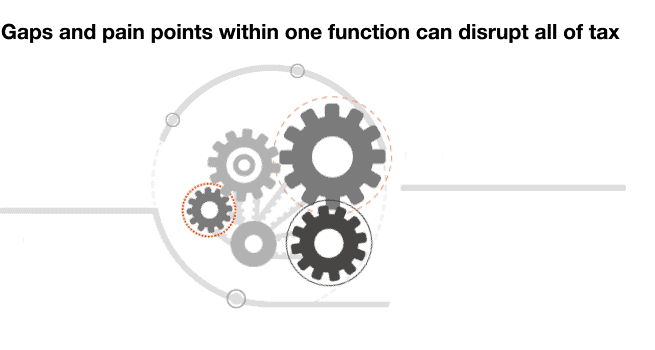The evolution of targeted Tax Managed Services: How can it be a game-changer for tax?
Managed services can help create value across different business areas — and tax is no exception. Many companies lean on PwC to perform Tax Managed Services for most of their tax department obligations. When we started to help clients in this way about six years ago with our dedicated practice, Insourced Solutions for Tax (IST), this more “full scope” approach was the first of its kind.
Now, managed services is not an “all or nothing” approach for tax. The concept has evolved to include a more “targeted” approach that can apply to a specific functional area within a tax department to better serve its needs. A “targeted” Tax Managed Service can help yield similar benefits with a wide range of options. This flexibility is catching the eye of many C-suites and tax executives.
But flexibility is not the only eye-catching aspect about targeted Tax Managed Services. Quantifiable benefits such as reduced costs and efficiencies can help solve more immediate problems, such as meeting compliance deadlines. Similar to larger-scale Tax Managed Services, a targeted managed service can assist the tax department to gain needed capabilities and operational readiness to support a wide array of strategic goals, such as supporting growth. It’s much more than what some may call “outsourcing.”
So what makes a targeted Tax Managed Service such a powerful solution if traditional approaches and resources are not getting the job done? Here’s how it can help address your tax department’s biggest pain points…


A targeted Tax Managed Service can...
We’re seeing “weak spots” in many long-standing tax department areas that require a higher level of technical experience and know-how, such as transfer pricing, state and local direct and indirect tax, and controversy. These areas are becoming more complex and time-consuming each year. Tax departments are finding it challenging to attract and retain talent who have deep technical, and often industry-specific, knowledge to perform this work.
It’s also more disruptive than ever to have “weak spots.” Tax reporting has become much more interdependent within the tax department, and one “weak link” can cause pain points to ripple across tax.
A targeted Tax Managed Service can help address these problems for larger, more complex tax functions with decentralized ad hoc processes, data, and teams. This solution not only can jumpstart less time-consuming and easier reporting but also help deliver analytical insights, strengthen governance, and reduce risk where those are needed most.
Example: Indirect tax reporting — including US sales and use taxes, as well as value-added and goods and services taxes levied worldwide — often can be a cause of financial concern due to its complexity, especially with higher-transaction volumes. Leading tax departments are embedding more advanced digital tax applications in the indirect tax area to help bridge the compliance gap and reduce risk.
But a formidable and ongoing challenge is having the right resources in place to monitor and react to real-time law changes around the world — which can be frequent. Those changes need to be reflected in the technology application, related systems, and procedures, requiring a high degree of technical and digital prowess. PwC has created a service offering, tax application managed service, that can help address this challenge while also expanding the company’s tax technical, industry, and digital know-how, typically at a lower cost than hiring in-house.
But the benefits don’t stop there. A targeted managed service can feel like a natural extension of the tax department — tax does not need to lose access to its in-house talent. Retaining this historical proficiency is more critical for compliance than ever. Companies that choose a targeted managed service may decide to rebadge personnel into the PwC Tax Managed Services team so they can continue to work on company tasks while also gaining other career opportunities. If rebadging does not occur, PwC talent with industry-specific technical and digital skills still can be leveraged, yielding a more sustainable approach to rising compliance burdens.
Compliance and reporting obligations become more difficult each year, but there may not be enough resources to address them all. Many other hurdles are arising, such as Pillar Two requirements, the new US corporate minimum tax, and increased audits globally — all of which are prompting concerns about the potential for adverse financial and reputational impacts.
C-suites also are leaning on tax to support strategic efforts. Tax may need to support cost take-out goals while also stepping up its ability to deliver quick insights for C-suite planning purposes relating to supply chains, digital investments, and ESG initiatives.
These “asks” are in addition to the historic and ongoing support that tax must provide with respect to financial statements and related planning. Key tax personnel typically focus on the income tax provisions, forecasting, modeling, and needed cash flow for tax estimates — many of which are critical for the C-suite. Resources focused on these tasks often are strained day-to-day, and in some cases, not available.
Targeted Tax Managed Services can help provide relief by focusing on the transformation of one or more specific functions. A holistic approach to people, process, and technology is leveraged, and can yield significant efficiencies that “free up” time. The result can be redeployment of specific people to focus on more value-added work.
Example: A critical foundation for tax reporting and planning is a company’s legal entity data, which may reside disparately within the company in silos, potentially causing wasteful duplication, errors, and risk. Tax departments often incur significant human capital to track this data and create organizational charts using manual methods.
A targeted Tax Managed Service relating to legal entity data management can help achieve a single source of “truth” used by tax and other corporate functions. Tax can help create organizational charts and track tax attributes with a touch of a button — freeing up resources to focus on more strategic tasks.
The right technology is a critical element for modernizing cumbersome, manual spreadsheet-based processes that may be adding to the company’s financial risk. But technology is rapidly advancing with increasingly sought-after functionality — tax departments are having difficulty keeping pace, especially given the time, cost, and resources needed to procure and execute such tools on their own.
Access to cutting-edge digital tools is an integral part of a managed service — whether it’s full-scale or targeted — and can be a key determinant for success. We’re seeing “win-win” situations where the company can promptly leverage our latest digital tools and get access to digital upskilling, which could produce immediate savings in licensing fees and training.
Robust digital tools embedded into a targeted managed service can help yield cascading benefits that tax and the broader organization need. Talent can be attracted and retained, e.g., by reducing those repetitive manual tasks better performed through automation. Analytical capabilities from digital can boost planning. Additionally, many tax executives applaud when digital tools enable the company to collect and track the right data for valuable tax credits or other tax cash opportunities.
Example: A targeted Tax Managed Service relating to customs duties and trade, specifically duty drawback, can leverage the latest digital tools and deep know-how to help build and maintain a process that can reap unexpected refunds. A customs and duties managed service also can efficiently address burdensome compliance areas, such as origin and classification.
The bottom line?
Companies can benefit from a targeted Tax Managed Service that “meets a tax department wherever it is,” connecting seamlessly with its overall tax lifecycle. Similar to a flexible piece of clay, the tax department can help mold a Tax Managed Service to fit whatever shape and scope it needs.
In particular, a company engaged in an acquisition may be facing a daunting integration of disparate tax systems and tax staff of differing levels of knowledge and experience, necessitating a more full scope Tax Managed Service to help streamline and meet income tax-related processes in a demanding time frame. In other situations, another tax function may have one specific area that is causing pain points, requiring a more targeted tax transformation.
Big or small, a targeted Tax Managed Service can be a powerful problem-solver, while also helping tax bolster its reputation as a strategic partner to the business.
Explore further
Contact us
Tim Gerspacher
Partner, PwC US
James Hanna
Principal, Value-Added Tax Leader, Chicago, PwC US
Principal, Customs and International Trade, PwC US





© 2017 - 2026 PwC. All rights reserved. PwC refers to the PwC network and/or one or more of its member firms, each of which is a separate legal entity. Please see www.pwc.com/structure for further details.




